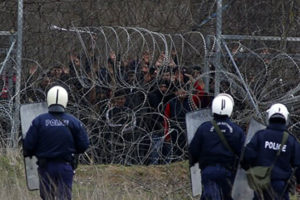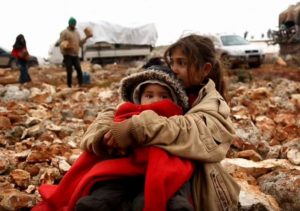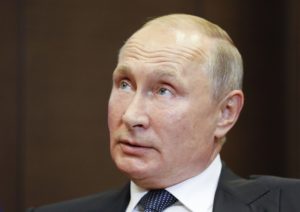Looking Back at Lebanon
The conflict in Lebanon ended a year ago last week. The Independent's Robert Fisk reflects on the human misery and destruction inflicted on the country -- and on how lucky he is to be alive after more than 30 years of reporting from some of the most dangerous places in the world.Editor’s Note: This column originally appeared in The Independent.
I don’t think war is addictive – for some, perhaps, but not for me. I was asked about this by a journalist in Beirut the other day and I responded in my usual, tired way. War is about history. Anyone who finds conflict addictive is sick. Yes, I agree with Winston Churchill who once said that there is nothing so satisfying as to be shot at without effect. A good dinner after a bad day is much to be enjoyed. But I hate wars.
I was thinking this over as I pawed through Double Blind, from which these photographs are taken. Its terrible, rage-filled, blood-spattered pages are an awful memory to me of last year’s war in Lebanon. It began on my birthday – my 60th birthday – when a dear friend called me up and told me what a terrible birthday I was going to have and I asked why and she told me that two Israeli soldiers had been captured by the Hezbollah in southern Lebanon and I asked Abed, my driver, to head south, because I knew that the Israelis would bomb across Lebanon. And I was right.
But sitting on my balcony, looking at these dreadful, brilliant pictures today, I am reminded of a journey back from Europe not many months after that war. I had been launching the French and Dutch editions of my book on the Middle East and had spent many hours in the boulevards of Paris and along the canals of Amsterdam. I had watched young couples – happy, safe – secure in so far as anyone can be in George Bush’s crazed world – walking with their children and laughing, and asked myself if I could have lived a happier life.
Selfish, of course, to reflect on such thoughts when the pages in front of me spoke of such pain. Pain – and I do not use this word lightly – has a special integrity, not to be denied. But selfish, I fear we all are. And I did ask myself whether I should have spent the past 31 years of my life cataloguing this awfulness. True, it was Alfred Hitchcock’s wonderful, funny movie Foreign Correspondent that persuaded me to go into journalism. But did it have to be like this? Not long ago, another dear friend wrote of me that I was “witty” (she also wrote that I was twice her age, which was a bit of a killer) – but I’m not sure that’s always true. You can’t wind the movie back when you are 61 years old. Wars do not un-do themselves. Your experiences remain with you, and I fear I have developed a dark, sometimes sinister view of the world.
When I first arrived in Lebanon, in 1976, I believed in life. Heroes don’t die. Like Humphrey Haverstock – the hero of Foreign Correspondent – I was safe (a hero, of course!), happy in my romantic job, untouched by tragedy. I had friends who had died – human beings every bit as much as those who feature in these pictures – but somehow they died in theatrical terms; they were characters who were switched off, deleted from my contacts book. “Died, 1976,” I would write. There was a girl, once, whom I cared about and who died in Beirut and whom I forgot because I couldn’t stand the thought of remembering her. And I carried on, jumping on Middle East Airlines jets to Dubai or Paris or Amman, for Iran-Iraq wars or for dinner with friends or with the Plucky Little King (King Hussain, no less) and I would return to bombed-out Beirut, to the smell of burning garbage tips, which was somehow more real than the order and security of France or Britain or anywhere else in Europe.
In the end, I think I did understand something about the Middle East, about its terrible tragedy, about our betrayal of its people. I’ve been welcomed into homes full of bereavement, treated with immense kindness and respect by men and women whose husbands, sons, daughters, wives, lovers, have been torn to pieces by munitions made in America and Britain and in France and Russia. God knows why they were so kind to me. When I was badly beaten on the Afghan border in 2001, I wrote that had I been an Afghan I would have done the same to Robert Fisk. Those who were trying to kill me had just lost their loved ones under an American air attack – a fact that those who chose to condemn me for my words always omitted to mention – yet I have lived an almost charmed life.
Today, I sit on my balcony overlooking the Mediterranean and riffle through the pages of Double Blind and I thank whatever God controls our lives that I have not died and I think of the good, loyal friends who have protected me and cared for me and I feel a most fortunate man. Few can say that.
Your support is crucial…With an uncertain future and a new administration casting doubt on press freedoms, the danger is clear: The truth is at risk.
Now is the time to give. Your tax-deductible support allows us to dig deeper, delivering fearless investigative reporting and analysis that exposes what’s really happening — without compromise.
Stand with our courageous journalists. Donate today to protect a free press, uphold democracy and unearth untold stories.






You need to be a supporter to comment.
There are currently no responses to this article.
Be the first to respond.